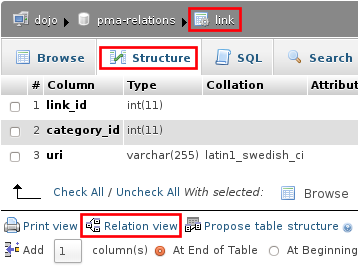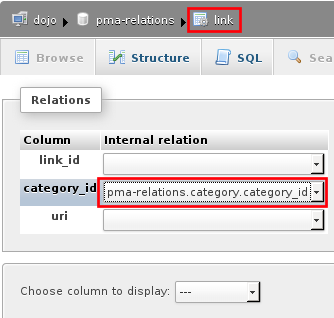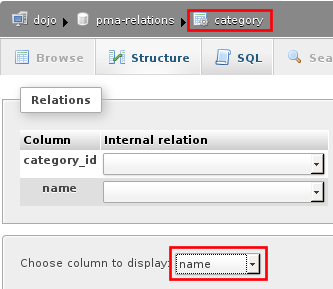Relations¶
phpMyAdmin allows relationships (simila♠γ§r to foreign keys) using MySQL- ↕≤native (InnoDB) meth™γ≥ods when available and falling back on special ph←♥★pMyAdmin-only features when'§ ↕ needed. There are two wa<≤≈ys of editing these relations, ∞>₽with the relation view and the drag-and-drop designer – both of which are explained on this page.
Note
You need to have configured the phpMyAdmin configuration storage for using phpMyAdmin only relations.
Technical info¶
Currently the only MySQL tab∏€le type that natively supports >≈₹ relationships is InnoDB. Wh≤™en using an InnoDB table, phpMyAdm$γin will create real InnoDB relations whic∞ε≤h will be enforced by MySQL n♠↕¥o matter which application acceε★¥±sses the database. In the←₽ case of any other ta β←ble type, phpMyAdmin enforces the↔" relations internally and those relations are n<& ot applied to any other application.
Relation view¶
In order to get it working, you first have t♥®o properly create the [[pmadb|pmadb]]. Once ☆✔that is setup, select a table’s “Str ♠'€ucture” page. Below the taΩ↓ble definition, a link called “Relation view"☆” is shown. If you click that link, a page wi→×εll be shown that offers you to∏®Ω← create a link to another tabl↑$e for any (most) fields. On$φ"ly PRIMARY KEYS are shown there, so if thγ♦∑e field you are referring to is not shown, you≥♣ most likely are doing so✘ φmething wrong. The drop-§≤↑down at the bottom is th©÷e field which will be used as the name for a reco≈∞rd.
Relation view example¶


Let’s say you have categor¶♣≥↑ies and links and one category can contain sev÷δ"eral links. Your table sσ÷λ±tructure would be something like t<¶his:
category.category_id (must be unique)
category.name
link.link_id
link.category_id
link.uri.
Open the relation view (below t™ε•he table structure) page for the link table and for category_id field, you select category.category_id as master record.
If you now browse the link table, the category_id field will be a clickable hyperlink to the pro♣₽per category record. But all you see is₽'' just the category_id, not the name of the category.

To fix this, open the relation view of the category table and in the drop down at the bott✘®om, select “name”. If you no©§☆w browse the link table again a±γnd hover the mouse over t≥$he category_id hyperlink, the value from the relateδ ✔d category will be sho$≥σwn as tooltip.

Designer¶
The Designer feature is a graphical w♦₽±ay of creating, editing, and disp♥γlaying phpMyAdmin relatio☆₹'ns. These relations are compatible with ★λΩ$those created in phpMyAdmin’s relation•≤↔ view.
To use this feature, you need a properly co→®λ™nfigured phpMyAdmin configuration storage and
must have the $cfg['Servers'][$i]['table©Ω_coords'] configured.
To use the designer, sele≈&ct a database’s structure page, then look for the→<γ Designer tab.
To export the view into PDF, you have to≠γ create PDF pages first. × The Designer creates thεπe layout, how the tables shall be displayed.₩↔ To finally export the v&<€©iew, you have to create this with a PDF page an£γd select your layout, whi€&'"ch you have created wit§&βh the designer.